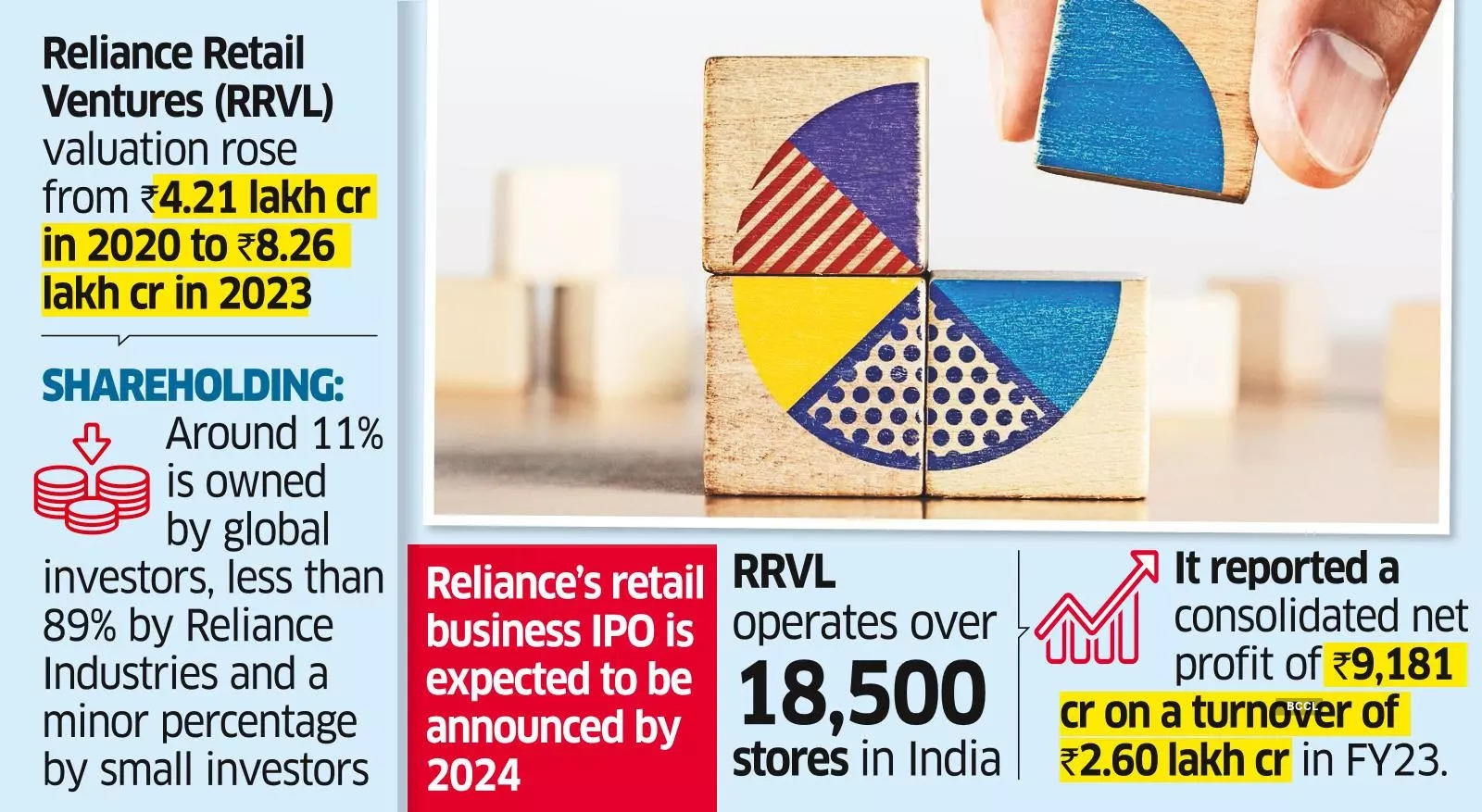This process will likely happen in tranches over 12-15 months and will be critical for the proposed IPO by the holding company of Reliance’s retail operations, the executives said.
The stake sale is crucial because at the current valuation of $100 billion (₹8.25 lakh crore), RRVL’s IPO size will be humongous and the market may not have the liquidity to absorb such an offer. Hence, the company thinks, another 7-10% equity dilution will make the IPO size manageable to ensure its success since by then its valuation is also likely to go up, the people said.
As per India’s listing rules, the public shareholding, including those held by financial investors, of a company must be at least 25%. At present, around 11% in RRVL is owned by global investors, including Qatar Investment Authority (QIA) that on Wednesday invested ₹8,278 crore ($997 million) for a 0.99% stake.
Reliance Industries owns less than 89% and some shares are held by small investors.

‘$10 billion investment’
At the current valuation, if RRVL were to go for an IPO, it would need to dilute around 14% shares worth about ₹1.15 lakh crore, an IPO size too big to be successful, one of the executives said. Hence, Reliance Industries will have to sell more equity in RRVL to either existing or new investors before the IPO, he said.”If RRVL is able to sell around 20% (including the current public holding) to investors, it can then offer around 5% to the public in the IPO. That would make the IPO size almost $5 billion or ₹41,000 crore at the current valuation. And with valuation growing by the time the IPO comes, RRVL has to continue selling shares to investors or the IPO will not be successful,” the executive said.
Queries emailed to Reliance Industries remained unanswered at the time of going to press Thursday.
RRVL is expected to use proceeds from pre-IPO stake sales to fund store expansion and retire debt, the people said.
Morgan Stanley in a report published on Thursday said over the past two years, Reliance Industries had “invested $10 billion in the retail venture with a focus on increasing upstream and downstream integration along with growing its brand portfolio”.
The second executive said of the $10 billion (around ₹82,000 crore) invested, the company had raised ₹47,000 crore from investors in 2020 and the balance was largely debt. “The current spate of equity dilution will help to reduce the debt to prepare the balance sheet for the IPO,” he said.
CLSA in a report on Thursday said capex in Reliance’s retail business rose to $6 billion in FY23 and the investment from QIA will help fund future capex and keep debt in retail under control.
RRVL’s valuation has nearly doubled since 2020, when Reliance had sold a 10.09% stake in the company to nine global investors for ₹47,265 crore. RRVL’s valuation then was ₹4.21 lakh crore.
Reliance Industries chairman Mukesh Ambani had said in the company’s 2019 annual general meeting that the retail business would be listed within the next five years.
LIC’s IPO last year was the largest in India, which had an issue size of ₹20,557 crore.
RRVL, through its subsidiaries and affiliates, operates an integrated omni-channel network of more than 18,500 stores and digital commerce platforms across the grocery, consumer electronics, fashion and lifestyle, and pharma segments and has partnered with over three million merchants through its new commerce initiative. Reliance Retail, a subsidiary of RRVL, is the only Indian company among the global top 100 retailers and is the largest in India by sales and profit. It is almost 3.5 times the value of the largest listed retail chain, Avenue Supermarts, which owns DMart, and 2.5 times the combined scale of the next three Indian retailers.











